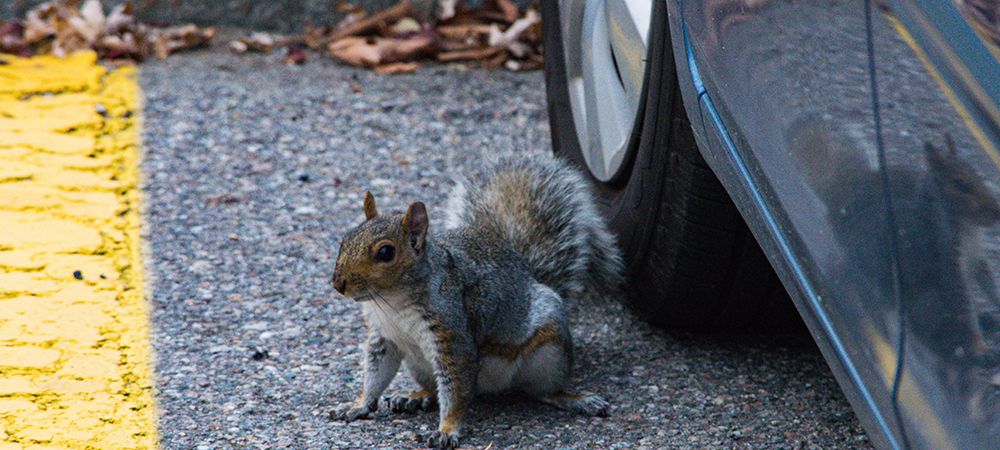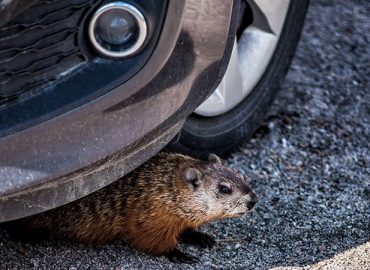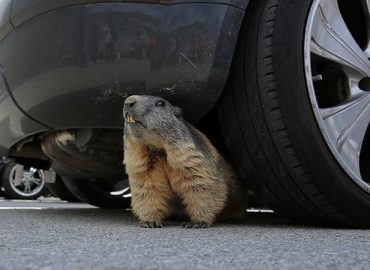Yes, rodents can cause electrical damage to cars. This issue began with the invention of cars and has remained ever since.
Irrespective of whether or not your car is new, rodents can find their way into your car. Aside from littering your car with its feces, it’s common to find rodents chewing wires in cars. More often than not, it’s this act that always leads to electrical damage in vehicles.
Failing to realize that rodents can cause electrical damage to cars can cost you a lot of money. You may not be fighting the real issue which is the rodent infestation. Moreover, fixing your car after rodents have chewed some wires can be stressful and expensive. Hence, it becomes important to find a permanent solution to the rodent infestation.
Thankfully, here we’ll discuss how rodents can cause electrical damage to cars. Also, we’ll provide tips on what to do when rodents cause electrical damage to your car. This article is your go-to for all your answers concerning rodents and electrical damage.
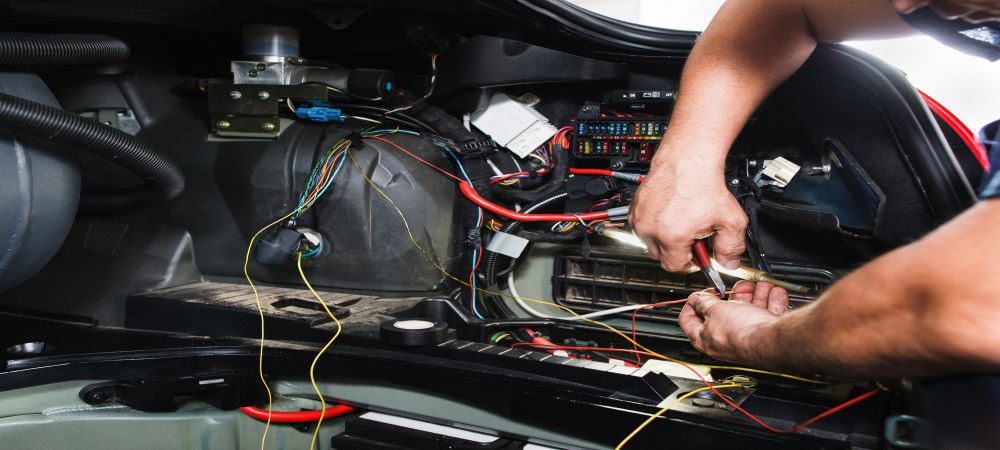
Rodents Bite: Electrical Damages and Their Effects
First of all, we’ll start with a little background on what you’re dealing with here. Rodents naturally stay in forests and bushes except for rats and mice.
Rats and mice live among human settlements either as pets or as scientific specimens. You can also find rats and mice around waste bins and dirty environments.
As nocturnal animals, rodents are more active at night and less active during the day. This explains why you may find them in boxes, wall folds, cabinets and in your car engine. As long as it’s dark and cool, rodents will make a home in it.
Rats have high natality rates due to their early sexual maturity. These little critters can reach sexual maturity as early as 5 to 6 weeks old. This is a clear explanation for the high number of rats you may find in your car.
Naturally, rodents feed on grains, pellets and any high carbohydrate food like cheese. You’ll also find rodents chewing on electrical appliances thereby causing electrical damage.
When rodents cause electrical damages in cars, it can cost you thousands of dollars to fix it. Not only do rodents cause damage with their mouth, but they can also do damage with their urine and poop too. Below, we’ll highlight some of the damage rodents may cause in your cars.
Infections
When rodents invade your car, they build nests in their space. Rodents can build nests with hairs, food particles and dry figs. It’s why we advise car owners to remove hairs and food particles in their car and the surrounding area.
As you will expect, there will be urine and traces of poop in your car. Rodents transfer infections like hantavirus via their urine and poop. Once in contact with their urine, chances are that you’ll infect yourself and others too.
Another way rodents spread their urine is via deposits in your car’s engine. These deposits usually get sprayed into your face when you turn on the air conditioner or heater.
Electrical damage
Because rodents have ever-growing teeth, they chew on substances to file their teeth. This is the reason you find rodents chewing on trees, bedsheets and wires.
There are different opinions on why rodents chew on wires. Here are two myths and the facts of rodents chewing on wires:
Rodents chew on wires because wires have soy-coating:
This is the most common reason people think rodents chew on wires. However, it’s not entirely true. Rodents also chew on wires because they look like tree shrubs although the smell from plant-based coating also attracts them. This chewing habit is to help them file their growing teeth.
Car wirings emit signals that attract rodents
This is not true. Rodents can sense magnetic fields but not electric signals. So, electric signals are not the reason your car’s engine attracts rodents.
Rodents stay in your car’s engine because of the warmth and corners it has. We can also safely say rodents prefer car engines because they have more wires to gnaw. Unlike earlier car models, newer versions of cars have more wires due to the presence of more sensors.
When rodents chew on your car wires, they can cause electrical damage to your cars. Common cases include:
- Blown fuses
- Shut computer modules
- Shut vacuum lines
- Shut connectors
- Electrical fires due to damaged wiring
- Electrical shock due to unprotected wiring
Other side effects of rodents in your vehicle
Rodents can cause your car to look less appealing aesthetically. Their droppings and decaying food they bring into your car can cause an unpleasant smell.
They also bring various decomposing insects into your car. Finally, their nails can ruin your car interior’s fabrics and other surfaces in the car.
Related Article: Mice Chewing Wires And Electronics In Your Car: What to Do
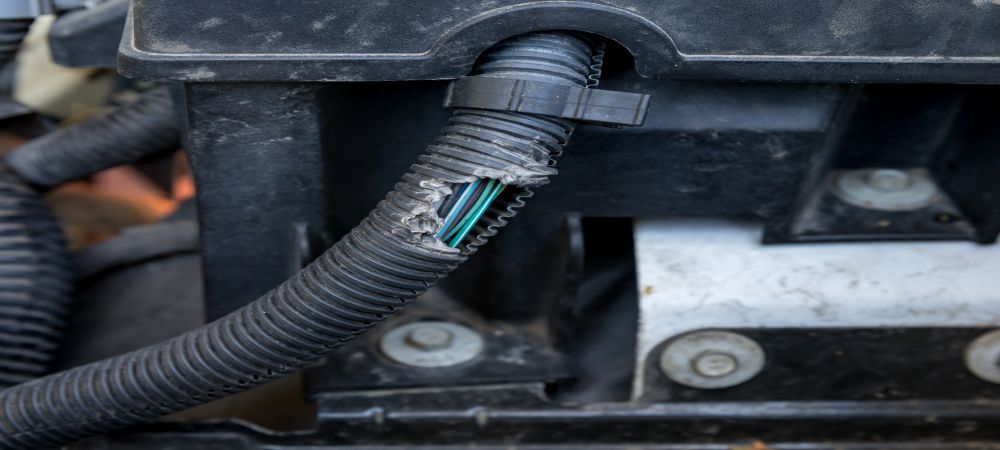
Why Do Rodents Invade Your Car and Cause Electrical Damage?
There are several reasons rodents chew on wires thereby causing electrical damage. Some say wires emit magnetic signals that attract rodents. Others say rodents love the taste of wires. Both reasons aren’t entirely true.
Below, we’ll give you the answers to why rodents cause electrical damages to cars.
Warmth
Rodents cause electrical damages to cars during any season, but it’s more common during winter. During winter, they look for warm places hence finding your car a perfect place to find warmth. So, they invade your car, build nests and multiply.
When rodents invade your car, they bring with them hairs, pellets and pet food to build nests. If you do not take proper measures, rodents will convert your car to their homes. It is why we often advise you to move your car and avoid parking on a spot.
Constant teeth growth
Rodents have ever-growing teeth. To reduce the length of their teeth, they chew on wires. Chewing on your car wires is their way of filing their teeth.
Without filing their teeth, they’ll be unable to eat properly. Your car wires help to keep their teeth trimmed especially if they have built a nest in your car.
Plant-based insulation coating
Naturally, rodents are drawn to food or anything that smells edible to them. Hence, it’s common to find rodents chew on car wires that have insulation coating made from plants.
For instance, if the insulation coating is made from rice husks, rodents will chew them. Rodents are likely to chew plant-based insulation coating made from peanut oil and soy.
When it’s warm, the pleasant vanilla smell plant-based insulation coating gives off can attract rodents. The vanilla smell from the car wires is appetizing to rodents. The result of this is often chewed wires.
What to do When Rodents Cause Electrical Damage to Your Car
Although some people find rodents cute, it doesn’t stop them from wreaking havoc in cars. Preventing rodents from causing electrical damage to your cars is by far better than trying to remedy the situation.
Here, we’ll give tips to help you prevent rodents from causing electrical damage to your car. Also, we’ll discuss hacks to managing an already infested car.
- Avoid parking your car on a spot as doing this attracts more rodents.
- Avoid parking your car on grasses or close to bushes.
- If in the garage, avoid food particles or pet food in your car or garage.
- Ensure you always check your car’s engine for rat nests.
- Always avoid pet food in your car or around your garage. They can attract rodents.
- Always wind up your car windows. Cars with open windows will always look abandoned to rats hence their invasion.
- Use rat repellents when necessary.
- If you suspect rodents have caused damages to your car, take it to a professional to confirm.
- It is best to see a professional when setting rat traps.
- When fixing your car, always visit a professional for interior detailing to fix rodent damage.
- Avoid trying to fix the chewed wires on your own except you’re a professional. Take your car to an auto repair shop.
- Get insurance to pay for the damages if you have comprehensive insurance coverage.
Related Article: Is Mice Damage to Your Car Covered by Insurance?
To Wrap It Up
When rodents cause electrical damage to cars, car owners tend to spend a lot on repairs. How much it will cost to repair rodent damage may feel more expensive if your insurance policy doesn’t cover rodent damage.
Asides from the cost of repairs, rodent invasion can cause minor and major accidents. Common accidents due to rodent damage on electrical parts include shock, shut connectors and blown fuses. In rare cases, sparks can occur due to rodents exposing parts of the wiring. In the long run, there can be a fire outbreak.
As part of mitigating the effects of rodent damage on your car, you’ll need interior detailing services. Here at Autoboss Vaughan, our car care experts have experience managing the effects of rodent damage on different vehicle models. Bring your car to our shop today!

